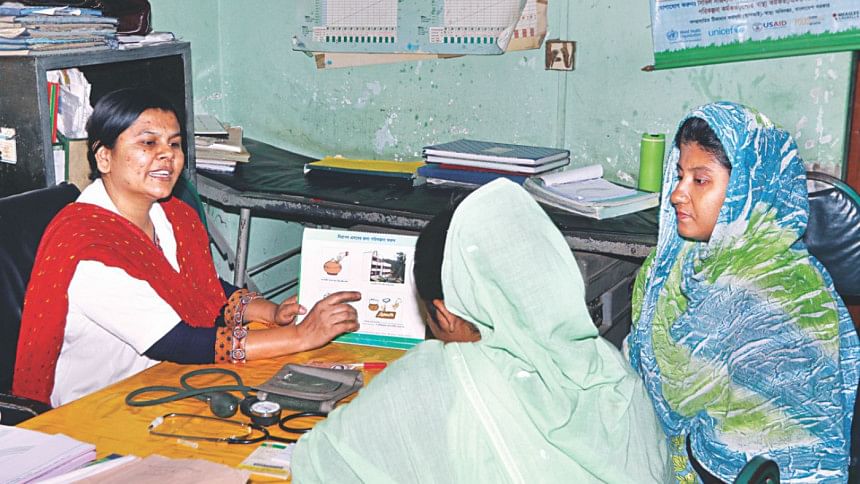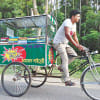Taking care of the urban poor's health

A young girl with some documents in her hands sat in the waiting room of Nagar Shastho Kendra in the capital's Meradia.
With dull eyes and a pale look, she entered the room of counsellor Feroza Begum. The 19-year-old seemed a bit relieved sitting in front of Feroza.
Salma Akhter was in the eighth month of her first pregnancy and it was her monthly visit to the health centre. When she was about to leave the room, Feroza told her what to do before and after the delivery and asked her to visit the centre also for effective family planning.
The health centre is part of Urban Primary Health Care Project (UPHCP) launched in 1998. With the slogan “Shebar Alo, Shobar Kacche”, the project started its operation in 2001 to give better treatment to underprivileged people in cities. Health centres running under the programme have been supported by the LGRD ministry.
Learning that Salma had no difficulty with her pregnancy, Feroza said the expected delivery date was close and Salma needed to be extra careful about her health. She should also save some money for the future of her and her child, the counsellor suggested.
Feroza also advised Salma to keep in touch with her gynecologist and said she should rush to the hospital if she had any bleeding.
Like Salma, people from low-income households have easy access to the urban primary healthcare centres where they get better and affordable services.
Ten such centres are operating in Dhaka -- five each in DSCC and DNCC areas, said Dr Mahmuda Ali, programme officer of Project Implementation Unit of Urban Primary Healthcare Services Delivery Project of Dhaka North City Corporation (DNCC).
Along with every healthcare centre, there is a hospital. “We provide all kinds of support during childbirth, including caesarean delivery at the hospital. A health centre has a medicine corner, lab facilities and ambulance services,” she added.
To get registered with a health centre, only Tk 10 is charged. Every patient has to pay Tk 45 every time he or she takes service. Besides, red card holders who had been selected through a field survey before the project was launched get free health services. The list is updated time to time.
“We give primary healthcare at the centre. For childbirth, we refer patients to the hospital [attached to the centre] in Tilpapara,” said physician Ayesha Khatun of Nagar Shastho Kendra.
Located on the ground floor of a four-storey building in Moddhopara, Meradia, the health centre runs with 16 staff. Every day, about 100 patients come to the Meradia centre for treatment. There is one room for counselling, one check-up room, nursing room, and a waiting room.
The contraceptive methods have side effects and many patients are not aware of it, Feroza said. “We advise them on what is best for birth control. Women from families with low income also bring their children to the health centres for vaccination.
“We hold campaigns and other awareness building programmes on family planning method used by both male and female participants,” Feroza added.
Under the project financed by the Asian Development Bank, Swedish International Development Cooperation Agency and the United Nations Population Fund (UNFPA), field workers also visit households in the neighbourhood to raise awareness about domestic violence against women.
The low-income group living in and around Meradia is being benefitted.
One of them, Hosna Begum, a domestic worker, said she had been visiting the centre for the last five years. “It is very close [to her house] and the people [giving services] are very cordial.”
Another health centre, Azimpur Nagar Shastho Kendra under Dhaka South City Corporation (DSCC), said it had distributed 1,339 red cards to destitute people until now. A total of 86,365 people have been registered with it.
The health centres under the project also conduct free screening for uterus cancer.
“Our focus is to give better treatment to the underprivileged people who are being deprived of treatment,” said Habiba Sultana of Azimpur Nagar Shastho Kendra while talking to The Daily Star.

 For all latest news, follow The Daily Star's Google News channel.
For all latest news, follow The Daily Star's Google News channel. 








Comments